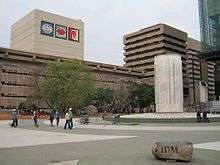South African State Theatre
The State Theatre in Pretoria, South Africa is the largest theatre complex in Africa.[1] It was known until 1999 as the Pretoria State Theatre.

History
The theatre was built on the old Market Square in Pretoria for use by TRUK (Transvaal Performing Arts Council). It opened in 1981 with performances such as N. P. van Wyk Louw's Germanicus, Jochem van Bruggen's Ampie, and Arthur Miller's After the Fall.[2] The first words on the new stage were spoken by veteran actor Siegfried Mynhardt.
In 1999, the National Arts Council of South Africa made a five-year agreement with Spoornet to name the theatre the Spoornet State Theater, through which it not only supported the theatre financially but also promoted the arts and key performers while exposing passengers to their work.[3]
In 2000, the state of Gauteng decided to close the State Theatre over financial mismanagement.[4] It reopened on April 4, 2001. [5]
Building
Seating 2,700, the complex covers 72,143 m². At first, there were four theatres: the Opera, Drama, Arena, and Studio venues. There were also several other rooms such as the Transvalia room, restaurant, cafeteria, where shows were occasionally presented. Today, there are six theatres, with the Momentum and Rendezvous adding to the total.
References
- "Profile". The SA State Theatre: Guide to accessing our information.
- "The Encyclopaedia of South African Theatre, Film, Media and Performance". Retrieved 2 March 2013.
- "Spoornet en Staatsteater werk saam". Beeld. May 24, 1999. Retrieved 2 March 2013.
- "Sportborge kan gerus die kunste meer ondersteun". Beeld. July 5, 2000. Retrieved 2 March 2013.
- "'Nuwe' teater". April 6, 2001. Retrieved 2 March 2013.